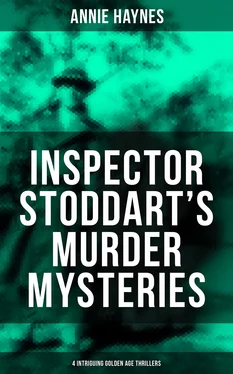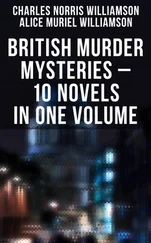There was evidently nothing more to be gleaned from Simon Lesson.
The two detectives walked back to Scotland Yard. As they came in sight of the entrance Stoddart turned to his junior.
"You will be ready to go to Brussels this evening, Harbord. There is not one moment to be lost. Spare no expense. If Pierre Picquet is alive we must have him over for the trial. Let me know of your success by wireless at the earliest possible moment."
Table of Contents
The trial of Basil Wilton for the murder of his wife had been fixed to take place at the Old Bailey early in November.
The court was crowded; the streets were thronged with disappointed sightseers. No trial of late years had so taken hold of the public imagination as this of Basil Wilton. The youth and good looks of the accused, combined with the fact that he was popularly supposed to have murdered his late employer as well as his wife, had aroused an enormous amount of excitement; and the fact of his love affair with Hilary Bastow—which had been allowed to leak out—had done nothing to allay it.
The judge was Mr. Justice Ruthven, as women whispered to one another with a pitying glance at the pale, delicate-looking young man in the dock.
There was a formidable array of counsel on both sides. The Attorney-General, Sir Douglas Wilshere, was for the Crown, and with him were Edward Davies, K.C., and James Francis Conroy. Arnold Westerham defended, one of the greatest—some said the greatest cross-examiner at the Bar. With him were James Backhouse and Huntley Sparkes. Villiers Lamb held a watching brief for Dr. Sanford Morris.
The case was opened by Sir Douglas Wilshere in studiously temperate language. There were those among the spectators who whispered that Wilshere was most dangerous when seemingly most moderate. In a quiet, unemotional voice he marshalled the facts against the prisoner, fitting each one into its place with deadly precision. Most damning of all was the question of time. The maid had testified to taking in tea for two, and to leaving Basil Wilton alone with his wife. She had then gone out and the medical testimony was decided that within a very few minutes of that time Iris Wilton had died. The evidence of the lift man and the hall porter, though in itself merely negative, further strengthened the case against the prisoner. They had caught sight of him in the hall and had not noticed that he carried a bag, they had seen no one go up, and in the case of the lift man he had taken no one up near the suspected time.
Inspector Stoddart, in spite of his strong belief in Wilton's innocence, was one of the principal witnesses for the prosecution. His description of the state of the flat, when he was called in, and of the finding of the bullets that had killed poor Iris Wilton—one lodged in the wooden mantelshelf, one in the wainscoting of the room—and of the subsequent fitting of them into the revolver concealed on the top of the wardrobe, was of absorbing interest to the listeners. His search of the prisoner's room, and the finding of the cloak-room ticket in the coat pocket there, were of course weighty points in the case for the Crown. The clerk in the cloak-room, contrary to expectation, did nothing to help them. He failed to identify Wilton as the man who took in the bag, and, more, declared his absolute certainty that he was not the man. On Wilton's being told to stand up, the clerk said he might be about the same height, but there all likeness ended.
Iris Wilton's will, made after her marriage and leaving everything to her husband, was put in as supplying the motive for the crime, but this was considerably discounted, as the cross-examination showed, by the fact that the fortune Iris Wilton had spoken of possessing had disappeared and nothing was left but a hundred or two in the Argentine Loan and a comparatively small sum of ready money in the Bank.
Still, there was no doubt the case did look black against the prisoner, and when Arnold Westerham rose to open for the defence most people felt that he had a hard job before him. He was not a great speaker. He would never emulate Felix Skrine's forensic triumphs, his strong point was the examination and cross-examination of witnesses. He outlined his case very briefly, pointing out the weak points of the prosecution, making the most of the fact that, though the revolver had been found in Wilton's bedroom, no previous purchase or possession had been traced home to him. The failure of the cloak-room clerk to identify him was also made the most of, and then the witnesses were called.
Basil Wilton had elected to give evidence, and he was naturally the first put in the box. But, briefly, his evidence was little more than a blank contradiction of that put forward by the prosecution. He told how his wife, pleading a headache, had insisted on his leaving her alone and going to his brother's. Like the maid, Alice Downes, he spoke of the total absence of visitors to the flat and stated that he knew no friends or relatives of his wife's. He positively denied knowing anything of the revolver and its concealment in his room, or of the cloakroom ticket in his pocket, and the Attorney-General's cross-examination entirely failed to shake him on any of these points.
Altogether it was conceded on all sides that Basil Wilton made a good witness, giving his testimony clearly, and not varying his story one iota under the most vigorous questioning. When at last he was allowed to step down from the box it was recognized that he had made a distinctly favourable impression.
The next witness called by the defence was Pierre Picquet. The sound of his name created rather a sensation. This was an entirely new name, as far as the public was concerned, and there was a general craning forward of heads at the little Swiss as he made his way to the stand and took the oath, kissing the book with an energy that made those near him smile.
Arnold Westerham hitched up his gown as he turned to him.
"Your name is Pierre Picquet?"
Picquet made an elaborate bow.
"Pierre Jean Picquet, monsieur."
"And you are a Swiss?"
"But no, monsieur. I was born in Switzerland—at one time I live in Berne, zat is true. But my fazer and mozzer are French and I—I am French too. And now I live in Paris also."
"Will you tell us what you know of this case?"
"Me? I do not know anysing." Pierre Picquet spread out his hands. "All I am acquainted wiz is ze brown beard. I make it."
"You made the brown beard?" Arnold Westerham went on, amid a silence in which you might have heard a pin drop.
" Oui, monsieur, oui . I made it—I make two and sell them to a tall blond Englishman."
Westerham took up the brown beard ticketed Exhibit No. 6 from the table beside him, and handed it to an usher, who took it to the witness.
"Is this one of the brown beards you made?"
Pierre Picquet took the beard, examined it with care; then, as he looked up, his face was irradiated by a wide smile.
" Oui, monsieur , it is as I say. I make dis beard, I make anozer too, anozer just like it."
"And did you sell them at once?" Westerham pursued.
Picquet's smile widened if possible.
"I make zem, what you call, to order, monsieur, for ze tall Englishman. He want zem, he say, for a fancy ball, and he not want ze friends to know he is zere, so he buy my beard to disguise himself zat people not know him."
"Why did he buy two?"
Picquet was still turning his beard about.
"Do you not see, monsieur, zat he is only on a visit to Paris, zat he lives in London, and zat—perhaps, I do not know—he will lead ze gay life at home? And for zat my beards are convenable."
"Quite, quite," Arnold Westerham assented. "Now, Mr. Picquet, I want you to look round the court and see whether you recognize the tall, blond Englishman for whom you made the beards."
Читать дальше












